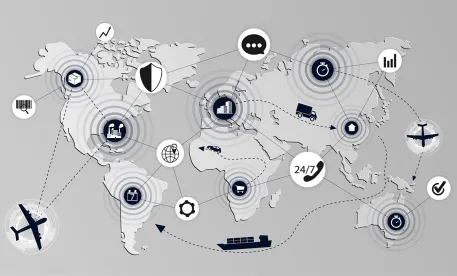Welcome to Foley’s International Trade, Enforcement & Compliance regulatory series.
The international trade and regulatory environment never has been more difficult for multinational corporations to navigate. For companies that operate, source from, or sell goods, software, or services across borders, legal complexities abound. International trade wars, rapidly changing export control and economic sanctions requirements, increasingly stringent anti-corruption requirements, and many other international trade and regulatory issues present existential risks to most multinational organizations.
To help businesses that conduct international operations make sense of the myriad ways in which the U.S. and other governments regulate global transactions and enforce laws applicable to cross-border economic relationships, Foley’s International Government Enforcement Defense & Investigations and Manufacturing Teams have come together to help multinational organizations manage their international trade and regulatory issues wherever they arise in this International Trade, Enforcement & Compliance regulatory series. We will be providing quick-hit insights into identifying, managing, and mitigating risks that confront multinational corporations every day, with practical advice going out from our inboxes to yours. Each post will highlight enforcement and compliance topics of relevance to all multinational corporations, with each post also drilling down into a select topic of concern to multinational organizations.
If you would like to be added to our Government Enforcement Defense & Investigations email list, click here to register.
U.S. Customs and Border Protection is not only the second-largest source of revenue to the U.S. government, but it also plays a central role in regulating imports. From collecting hundreds of billions of dollars of tariffs to implementing the ongoing trade war with China, blocking goods that were manufactured using forced labor, or enforcing regulations of over forty federal agencies that pertain to imported goods, Customs acts as the gatekeeper to U.S. shores.
What Are U.S. Customs Requirements?
-
U.S. Customs places the full burden for accuracy in the importation and payment of duties on the importer of record.
-
Requirements include accurately determining the country of origin, correctly classifying the goods, determining if any extraordinary duties are due, complying with all free-trade agreement requirements, ensuring goods are not a product of forced labor, and fully paying all tariffs.
Why Is U.S. Customs Important to My Company?
-
Record tariff levels increase the size of potential penalties for and risks of non-compliance.
-
Penalties start at 25 percent of the underpaid tariffs and can range up to or even exceed the value of the goods. Customs can seize goods that violate Customs requirements. Egregious cases can be punished with criminal penalties and loss of import and export privileges.
-
Record penalties, enforcement actions, audits, and inquiries underscore the importance of customs compliance.
-
Because Customs enforces the regulations of other federal agencies for imported goods, Customs is the gatekeeper for ensuring compliance with numerous regulatory requirements and can seize non-complying goods.
What Are the Newest Risks for Importers?
-
Customs migration to electronic filings allows Customs to run sophisticated searches to find potential duty underpayments, sharply increasing the risk of Customs identifying import errors.
-
The False Claims Act rewards actions involving unpaid tariffs and encourages whistleblower activity for violations.
-
Increasing enforcement of laws that enable Customs to block goods made by companies that rely on forced labor or human trafficking, or that import from the Xinjiang region of China, put customs compliance at the center of supply chain oversight and due diligence requirements.
What Are the Most Common Customs Errors at Typical Importers?
-
The most common general errors we see are: (1) over-reliance on customs brokers; (2) failure to have a Customs Manual; (3) failure to have an up-to-date Customs Classification Index; (4) failure to mark goods correctly; (5) failure to manage supply chains by regulator expectations; and (6) failure to maintain required records.
-
The most common import-related errors we see are: (1) failure to provide all required Form 7501 entry and backup information; (2) failure to recognize applicable antidumping/countervailing duty orders; (3) failure to properly determine the country of origin; (4) failure to classify goods correctly; (5) failure to declare correct entered value based on relevant Incoterms® terms of sale; (6) failure to include off-invoice items such as assists and royalties; and (7) failure to follow USMCA/FTA requirements when claiming preferential treatment. We also commonly find related parties failing to perform transfer pricing studies or to set their affiliated pricing appropriately.
-
The most common compliance errors we see are: (1) failure to maintain a complete, accurate, and tailored customs compliance policy/customs manual; (2) failure to maintain an up-to-date Classification Index and share it with Customs brokers; (3) failure to manage and oversee Customs brokers/freight forwarders; (4) failure to implement consistent and timely post-entry checks and to follow-up with Post Summary Corrections/Protests Against Liquidation; (5) failure to follow all requirements to secure preferential treatment under USMCA/FTAs, including failure to secure accurate certificates of origin at the time of entry; (6) failure to identify and manage tariff-saving opportunities correctly; (7) failure to implement required recordkeeping; and (8) failure to train all personnel who have customs-related responsibilities.
What are the Most Common Missed Tariff Savings Opportunities for Typical Importers?
-
The most-missed tariff savings we see are: (1) overpaying due to failure to classify goods correctly; (2) failure to seek advisory opinions to resolve gray areas; (3) failure to identify tariff-engineering opportunities and to manage the supply chain to minimize tariffs; (4) failure to use duty drawback; (5) failure to use temporary import bonds, foreign trade zones, or bonded warehouses; (6) failure to use the first-sale rule; and (7) failure to file Post Summary Corrections or Protests Against Liquidation to correct the overpayment of duties.
What Are the Most Important Steps to Minimize Customs Risks at My Company?
Foley recommends that clients focus on strategic customs planning, risk management, and compliance solutions. Key areas of focus include creating a companywide Customs Classification Index; valuation; routine Customs audit and post-entry checks; tracking of assists; identifying all goods subject to Section 232, 301, and antidumping/countervailing special tariffs; and FTA compliance.
Emphasis on compliance and avoiding issues before they attract Customs attention should include:
-
Risk-Assessments and Compliance. Our customs attorneys regularly conduct customs risk assessments and create tailored compliance solutions for companies, help companies classify their goods and create Customs Classification Indices, and conduct customs training.
-
Internal Customs Audits. Our customs attorneys create and guide companies through internal customs audits that help importers identify and correct issues before their discovery by Customs.
-
USMCA/FTA. Our customs attorneys, including those in Foley’s Mexico office, help importers navigate the complicated USMCA rules to ensure compliance







 />i
/>i

